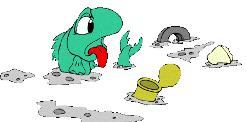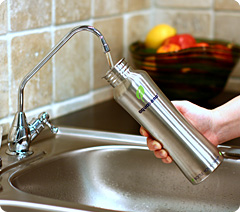Solutions to Water Pollution
5 Simple Ways
You Can Make a Difference
by Merlin Hearn
Note: As an Amazon Associate I earn from qualifying purchases.
The key solutions to water pollution come down to individual responsibility because we all have a direct impact on the environment.
From the toilet we flush to the garbage we throw away, we stamp our footprints into our environment on a daily basis.
What kind of daily footprints do you leave? Are they large and deep or small and light?
While millions of people take advantage of common conveniences such as buying plastics or driving cars, our environment is slowly being degraded.
For example, the Environmental Protection Agency (EPA) has designated 40 percent of our rivers and lakes as unsafe for swimming and fishing.
The Clean Water Act
Back in the 70’s the restrictions on industries and companies for pollution were pitifully minimal. The government eventually saw the effect and created the Clean Water Act.
This bill had a huge impact and helped to clean up much of the polluted waters.
However, two things the act called for never happened:
- zero discharge of pollutants by 1985 and
- swimmable waters by 1983.
The number of rivers in the U.S. that have restricted fish consumption warnings has also risen sharply since the early 90’s.
The following 5 solutions to water pollution are ways that we all can make a difference.
Solution #1 - Enforce Existing Laws
One of the first solutions to water pollution is pretty simple—tell your politicians to enforce existing laws.
When a politician touts his new anti-pollution bill that he claims will clean up the environment, it means little if they continue to allow existing laws to go unenforced.
Tell your politicians what you think. Encourage them to enforce existing laws such as the Clean Water Act.
Beyond enforcing laws, there are some practical steps that we can take as individuals to limit the pollution in our neighborhoods and cities.
Solution #2 - Stop Nutrient and Pesticide Pollution
If you are putting “normal” fertilizer, pesticides, and other chemicals on your lawn or in your gardens, you are contributing to the pollution problem.
While you may find these products helpful, much of their volume is being washed off your lawn and into the nearest waterway.
They also tend to degrade the quality of your soil, causing more and more reliance on the chemicals over time.
For ideas on how to have a nice lawn without polluting our waterways, check out this article on organic lawn care.
Solution #3 - Drive Less
Nitrogen deposition from air pollution is a big part of the nutrient pollution problem.
How much we drive, how large a vehicle we have, and many other factors contribute to how much pollution we are putting out individually.
Be conscious of the emissions that your car spews out and keep your car well maintained. Think about leaning towards a hybrid or electric car if you drive a lot of miles every day.
Use public transportation more often. Our government pays a lot of money to put these public systems in place.
Driving less is something we can all do better at, and all of the relatively small differences each person makes will add up when summed across millions of drivers.
Solution #4 - Use Green Household and Personal Care Products
As consumers and citizens we have an obligation to know what effect our consumer by-products are having on the planet.
Many of the chemicals found in our food, household cleaners, personal care products, and medications are all being dumped back into the waterways.
These chemicals are NOT adequately filtered through municipal water treatment facilities.
Thus, if we are not drinking filtered water, we are consuming many of these chemicals (as well as other dangerous contaminants) on a daily basis.
If you don't use a water filter system, YOUR BODY will be the filter.
This cyclical process is becoming more and more degraded as time goes on and the fish and water toxicity are reaching unheard of levels.
To act on this important solutions to water pollution, buy more organic food and “green” household cleaners and personal care products. And please don’t flush your medications down the toilet!
Solution #5 - Use Less Plastic & Don't Litter
At the rate we’re going, the growing impact of plastic pollution on our oceans will be one of the big disaster stories of this century.
Try to figure out ways you can use less plastic, especially plastic storage bags.
This type of plastic is easy for wildlife to swallow and eventually causes death. Plastic factories also deliver much of the pollution that is not bio-degradable.
Simply say no to bottled water! I know it is convenient, but the environmental impact of bottled water plastic is huge.
Over 1.5 billion tons of plastic water bottles end up in U.S. landfills each year. It takes over 300 years for plastic to degrade.
Up to 40 percent of all bottled waters are merely re-processed tap water.
A much healthier and less expensive solution to bottled water is to invest in refillable glass or BPA-free plastic water bottles or stainless steel water bottles and fill them with filtered drinking water.
And last but not least, don’t litter. Litter from land is carried into the oceans and beaches through wind and river. If you see someone else’s litter, don’t be shy or hesitant in picking it up either. Every little bit counts.
Return from Solutions to Water Pollution to Types of Water Pollution
If you would like to reproduce or republish this article or any other article on this site, feel free to do so but please include a reference or link to the article at WaterBenefitsHealth.com.
Sign Up for Our Monthly
Newsletter
Visitor Comments
"This was the best and most straight forward info on the net yet. I asked a question and got an answer that made sense. Thank you so much!" - Linderlinder
FINALLY!!! I have been wondering about this for years with no 'solid' answer. This is exactly what I've been wanting to know! Thank you for this share..." by Andy
"Thank you for the information, Nancy. I appreciate it. Your article and findings are very helpful, referring to dehydration." - Carolyn
"Lemon water is one drink both my wife and I can't drink. It upsets our stomachs. We are in our sixties and in very good health—well, better health now that we drink about 2 liters plus of water each day. It has made so much difference to our digestive systems and recovery every day. Thank you for your website and effort." - Rod




